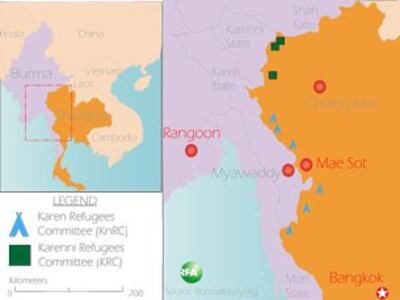MAE USU, Thailand—Ethnic Karen refugees describe harrowing escapes from armed clashes in Burma and say much more aid is needed at rough camps on the Thai side of the border, where food and medicine are in short supply.
The leader of the Uthuhta refugee camp, near Mae Usu village in western Thailand, said residents lack adequate rice, firewood, and cooking utensils, and that unhygienic conditions are breeding disease.
“We fled our villages with only the clothes on our backs, so we need clothing and other basic necessities to maintain personal hygiene,” the camp leader said.
Since June, more than 1,000 members of the Karen ethnic minority, including some 600 children under 12, have descended on the Uthuhta camp, 80 kms (50 miles) from the border with Burma.
Three organizations—the Mae Tao clinic, the Thai-Burma Border Consortium, and Global Health Access Program—are currently donating clothing and medicine to the camp.
Residents say the United Nations High Commissioner for Refugees is distributing materials for them to build shelters.
But the camp leader, who asked not to be named, said more aid is needed.
“There have been incidences of malaria in the camp but there isn't enough medication to treat it,” he said.
Another refugee, who also declined to be named, said children are particularly at risk.
“Among the refugees, there are babies and children of all ages. Due to the rainy season there have been outbreaks of malaria and cholera,” he said.
Combined attacks
The Karen villagers temporarily housed at the Uthuhta camp are among some 4,000 who have fled to the Thai-Burma border following attacks by the combined armies of the Burmese military and the Democratic Karen Buddhist Army (DKBA).
The combined forces have been skirmishing with the largely Christian members of the Karen National Union (KNU) since early June.
The Thai government has set up four camps for the refugees, who have faced continuous shelling from the military and the DKBA.
The Thai military said it is assisting camp residents and has been monitoring the border to ensure that Burmese forces and the DKBA don't cross into Thai territory to attack the refugees.
Pan Kyon and Hlaing Bwe townships in Burma’s southeastern Karen state have seen some of the worst fighting. Those territories are controlled by the KNU’s 7th brigade.
Dangerous escape

Refugees at the camp described fleeing their villages on a journey fraught with danger.
One older woman said she was lucky to have escaped with most of her family members.
“One of my sons was killed by the Burmese military when he was caught returning to the village to get food,” the woman said.
“Landmines have been planted everywhere and it is very frightening. The 10 members of my family and I were able to escape only with much difficulty,” she said.
Another Karen refugee at the Uthuhta camp said the military was abducting villagers who were unable to flee the attacks.
“Villagers are being involuntarily drafted into army service as equipment porters,” he said.
Fostering infighting
A DKBA detachment entered Mekatha village late Monday in Mon state, which borders Karen state to the west.
The territory is currently under control of the KNU’s 6th Brigade.
On Sept. 1, DKBA soldiers began forcing villagers to help them build barracks and bunkers in the area, according to the captain of KNU forces in the area.
The Brigade captain said the KNU hasn't yet attacked the DKBA soldiers because “being all Karen, we do not want to cause any bloodshed.”
“Perhaps they forced their way into our territory to develop a 5,000-ton logging concession they had been granted by the junta,” the captain said.
“But if this is really the beginning of a military offensive, the KNU will have no choice but to move against them,” he said.
Supporting a rival faction within an ethnic group to weaken its support base is not a new tactic for Burma’s ruling junta.
Bid to draw in insurgents
Burma’s military regime has been making efforts to bring armed ethnic groups into the fold by convincing their leaders to join the armies with the country’s border forces.
If the insurgents refuse, Burmese military leaders court splinter factions within the group and pit them against each other.
Last week, up to 30,000 refugees crossed Burma’s northern border into China to escape battles between the Burmese military and the ethnically Chinese Myanmar National Democratic Alliance Army (NDAA) in the country’s Kokang region.
The NDAA split after recent pressure from the Burmese government, which ordered the group to come under its command.
One group agreed to join Burma’s military while the other, led by regional leader Peng Jiasheng, refused. That faction has since been pushed out of the region by military forces.
Even as the Burmese military has taken control of the Kokang region from the NDAA, the ruling junta has entered negotiations with the Wa ethnic group seeking independence in the country’s northern Shan state.
Burmese political and military analysts say the moves are meant to pressure insurgent groups into surrendering as part of the military government’s plan to effectively control all of the country’s armed ethnic groups ahead of planned elections in 2010.
Original reporting for RFA’s Burmese service by Nyan Win Aung, Injin Naing, and Ye Htet. Burmese service director: Nyein Shwe. Translated by Nyein Shwe and Soe Thinn. Written for the Web in English by Joshua Lipes. Edited by Sarah Jackson-Han.
